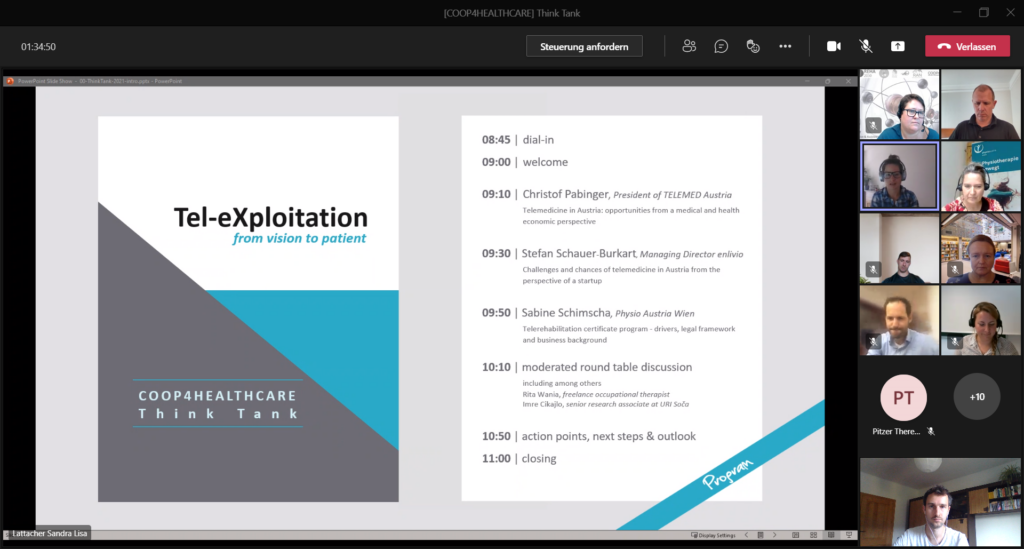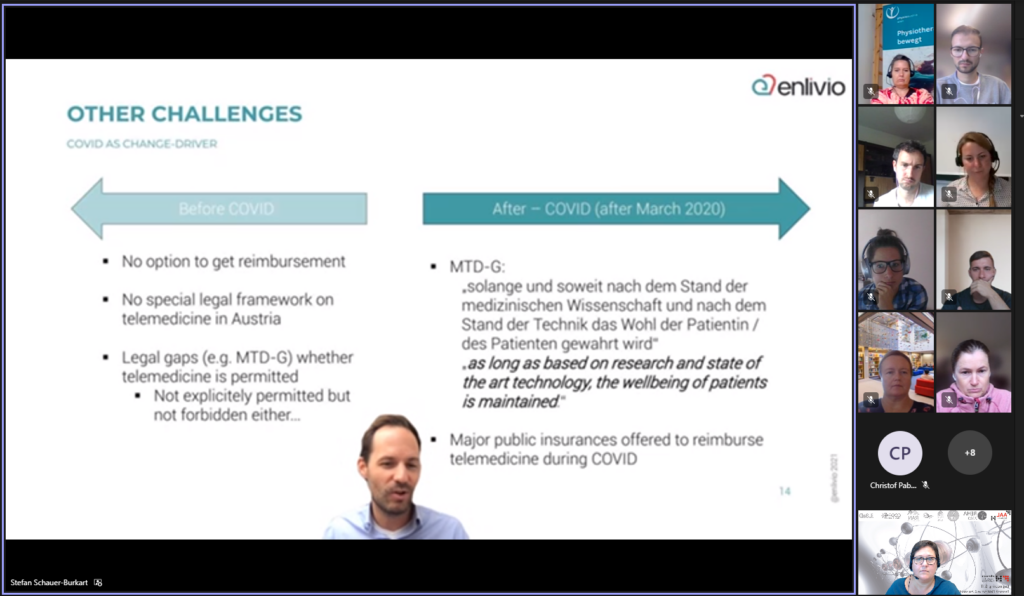During the COOP4HEALTHCARE project (2018-2020) we were able to organize 2 meetings within our COOP4HEALTHCARE Think Tank. We promised to conduct Think Tank meetings periodically also beyond the official project end. In 2021, we were happy to invite our followers to another Think Tank event.
But what exactly is a Think Tank?
Practically speaking it is a group of stakeholders and experts addressing and discussing key challenges and future trends. In addition a Think Tank is built to initiate innovative processes and/or give advice and support. Best case is that also clear and structured action points are derived from Think Tank discussion, to directly make use of the gained knowledge.
Our Think Tank in general, which we built in the framework of the concluded research project COOP4HEALTHCARE focuses on improving the provision of health (-care) services.
The first Think Tank focused on the topic of Smart Living, as it was conducted in the framework of the famous Innovation Congress and the Smart Living Forum. The second Think Tank in March 2021 focused on the topic of interregional challenges and opportunities in healthcare in Austria and Slovenia, as well as outcomes of telecare use by informal caregivers of older people.
In this year’s and with that the third COOP4HEALTHCARE Think Tank we wanted to discuss what it takes to bring telehealth services from a very first idea to exploitation. How can solutions evolve on the market sustainably and in the long term? Which barriers can arise, and which best practice solutions are already available?
The restrictions we faced, while fighting a worldwide pandemic, became one of the main drivers of the digital transformation. Telehealth services emerged, health care processes like electronic health records were adapted, and the need for telemedical and teletherapeutic applications increased.
To discuss these pressing issues, we invited:
Christof Pabinger, club president of TELEMED Austria, lecturer in telemedicine at the Medical University of Innsbruck, owner of 2 private clinics and founder of a telemedicine startup. In his lecture, Mr. Pabinger talked about medical and health economic potentials of telemedical approaches in Austria.
Stefan Schauer-Burkart, co-founder of enlivio, an Austrian start-up for remote physiotherapy that was founded during the Corona crisis in 2020. In his talk, Mr. Schauer-Burkart spoke about the framework conditions, barriers and opportunities during the founding stage.
Sabine Schimscha, who is a Physiotherapist and works in federal association for physiotherapy in Austria She is co-initiator of the “Telerehabilitation” certificate program at the FH Campus Wien. Ms. Schimscha introduced the Telerehabilitation certificate program, and presented about the drivers, legal framework and business background.

Further discussants during the moderated round table discussion were
- Rita Wania, freelance occupational therapists, who created a FB group on teletherapy during the first Lockdown
- Daniela Krainer, Senior Researcher and Head of Research Unit Active & Assisted Living at Carinthia University of Applied Sciences.
- Harald Jagos, CEO & Co-Founder at reha buddy, a start-up that digitizes standardized assessment.
- Hanna-Greta Puurtinen, Development Manager at Tampere University of Applied Sciences and European Mentor in the COOP4HEALTHCARE Project.

From the keynotes and the discussions we derived the following Action Points concerning Teletherapy, Telemedicine and Teleconsultation:
- Risk Management: “what happens if something happens”: Everything related to telemedical solutions is rather new to patients/users and therapists/coaches. So, cases where patients got seriously injured or ineffective therapy as a consequence of wrong execution of exercises are not known so far. But this has to definitely be taken into account when Tele solutions continue to develop so rapidly.
- GDPR awareness and Data Security: The same holds for GDPR issues and data security, especially when using external platform solutions, like it is common for video calls or cloud solutions for data documentation.
- Awareness of the legal basis for Medical Product: Declare a product as a medical device is desirable, but with that, a solution may not be updated in an agile way anymore. Every update needs to be reviewed and approved in terms of the Medical Devices Act (Medizin Produkte Gesetz, MPG) , and this takes time – which again could be a drawback in the current fast moving time. In general, the awareness of what the legal basis for MPG should be raised.
- Increase user knowledge in Austria and experienced educators and users: As said, telemedical solutions are rather new, and with that the experience of educators and users is limited so far. A focus should be put on increasing the user knowledge in Austria.
- Lack of Resources: financing in general and specifically of monitoring effort for asynchronous training: Resources are a big issue in this regard, and probably the point which is the one talked about most frequently. How is asynchronous training accounted, including the review of asynchronous sessions, writing feedback and tips, and the increased administrative work. And there is a lot more, like education of therapists, training of patients related to the online solution and devices, inclusion of insurances,…
- Bottom up – learn from the market (participative process): Look at the market, and see what is already working, what is accepted by therapists, patients, and other stakeholders, adapt and go on. It may be a step-by-step process, but this might be also a main driver with which insurances can be brought on board.
- Clarify: Awareness that there are studies out there – telemedicine and teletherapy is already evidence-based or do we lacking evidence?Something that needs to be clarified is if there is lacking evidence or not when talking about telemedicine. In the community, the opinions are divided.
- Look abroad! There are already existing, good solutions across borders. So why not get inspired.
- Business models for start-ups: We are lacking business models for start-ups in the field of telemedicine.
- Change Management: A big word to conclude our action points. How to adapt processes, methods and goals within an existing company to move from an offline solution to an online solution?

We would like to thank our participants for the active discussions, and the open exchange.
We see it as a fantastic result that we were able to define 10 action points related to tele solutions where we need to put an eye on in the coming months, and we would be happy if you spread the word.
See you at the next COOP4HEALTHCARE Think Tank.

